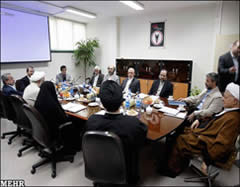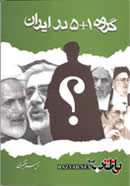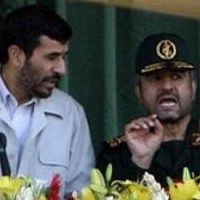![]()
Sun, Jan 22, 2012
Iran: In another blow to his status, Rafsanjani loses control of Iran’s largest university
Originally published in the Meir Amit Intelligence and Terrorism Information Center’s bulletin number 151.
Only two weeks after his website was blocked by the authorities and his daughter was sentenced to six months in prison and banned from any public activity for five years, Ali-Akbar Hashemi Rafsanjani, chairman of the Expediency Discernment Council and former president, suffered another blow when the board of trustees of the Islamic Open University (Azad University) chose a new chancellor to replace Abdollah Jasbi, one of Rafsanjani’s allies.
The university board, headed by Rafsanjani, decided at its meeting to appoint Farhad Daneshjou chancellor of the university, ending Jasbi’s 29-year tenure. Daneshjou, who received his PhD from the Polytechnic of Central London, is the brother of Kamran Daneshjou, the science and technology minister in Ahmadinejad’s government. The decision to appoint Daneshjou was approved by the Supreme Council of the Cultural Revolution, headed by Ahmadinejad. Five of the nine university board members voted for the appointment, including Daneshjou himself; his brother, the science minister; Hojjat-ol-Eslam Mohammad Mohammadian, the Supreme Leader’s university representative; and Marzieh Vahid Dastjerdi, the health minister. The university board meeting was held on the background of an announcement released by the science minister that, unless a new university chancellor is chosen by January 20, the Supreme Council of the Cultural Revolution will appoint its own administrator to head the university.
Following the decision to appoint Daneshjou chancellor of the university, Rafsanjani argued that the appointment is illegal. An official statement released on his behalf by the secretariat of the board of trustees said that, at the beginning of the meeting, Rafsanjani had suggested summoning the twelve candidates for chairman of the university to the board meeting to hear their plans for the university. A number of board members were against the proposal and claimed that it was enough to go through each candidate’s curriculum vitae to make a decision. The announcement released on Rafsanjani’s behalf also said that the board meeting ended without an agreement after several of its members voted for Daneshjou without the consent of the chairman of the board, rendering the decision legally invalid (ILNA, January 12).
Abdollah Jasbi also said during a press conference that the decision to appoint Daneshjou chancellor of the university is illegal. He noted that, during the board meeting, he had offered to resign and let Rafsanjani appoint a provisional administrator to manage the university until a final decision on the appointment of a chancellor was made, but that proposal was not accepted (Mehr, January 11).
However, those members of the university board who supported Daneshjou’s appointment for chancellor of the university argued that the decision is legal and final. Hojjat-ol-Eslam Mohammad Mohammadian said at a press conference that all board members had examined the scientific and executive background of the candidates for chancellor and decided to choose Daneshjou for the job.
Speaking at the same press conference, Daneshjou himself said that only four of the nine university board members had been opposed to holding the vote during the last meeting and demanded that it be postponed until all candidates personally submit their plans for running the university. He said that, prior to the vote, Rafsanjani had told him that he was not opposed to his nomination. He called on the board members to accept the majority opinion and defined the statement released on Rafsanjani’s behalf as a decision reflecting the minority opinion (Fars, January 11).
The decision to appoint Daneshjou chancellor of the university instead of Jasbi reflects the ongoing decline of Rafsanjani’s public status. Azad University is considered the largest in Iran. It has over 1.7 million students who study in about 400 branches across Iran. For the past several years, President Ahmadinejad and Rafsanjani have been in a fierce fight for control of the academic institution. Ahmadinejad claimed that Rafsanjani and his allies, who controlled the board of trustees, took advantage of their position to advance political interests, and even accused them of corruption. After the 2009 elections the president accused Rafsanjani and Jasbi of mobilizing university resources for the benefit of reformist opposition leader Mir-Hossein Mousavi.
To restrict the government’s ability to interfere with university affairs, the board of trustees decided to declare the university assets an Islamic endowment (waqf). The purpose of the declaration was to keep the government from taking over the university and its property. After the decision was announced, the president, in his capacity as chief of the Supreme Council of the Cultural Revolution, made two amendments to the university regulations aimed to significantly increase the power of government representatives and the president-led council in university affairs at the expense of its board of trustees. The amendments also put a limit on the tenure of the chancellor of the university.
In October 2010 Supreme Leader Ali Khamenei was forced to intervene in the severe conflict between Ahmadinejad and Rafsanjani. He ruled that the decision of the board of trustees to declare the university assets an Islamic endowment should therefore be revoked, but that the amendments made to the university regulations by the Supreme Council of the Cultural Revolution should be revoked as well.
Meanwhile, the reformist daily Sharq reported this week that the Ministry of Islamic Guidance recently approved the release of the book Group of 5+1 in Iran, which portrays Rafsanjani as the main supporter of the riots that broke out after the 2009 presidential elections in Iran.
The book portrays Mir-Hossein Mousavi, Mehdi Karoubi, Mohammad Khatami, and two top reformist clerics Ayatollah Yousef Sanei and Ayatollah Mohammad Mousavi Kho’iniha as leaders of the riots, and Rafsanjani as the one pulling the strings in the riots (Sharq, January 15).



 RSS
RSS












Iran: In another blow to his status, Rafsanjani loses control of Iran’s largest university | Middle. http://t.co/2Azouujb
Gb SIMI: Iran: In another blow to his status, Rafsanjani loses control of Iran's …: It has over 1.7 million st… http://t.co/rhjpoLuz
Iran: In another blow to his status, Rafsanjani loses control of Iran’s largest university | Middle. http://t.co/2Azouujb